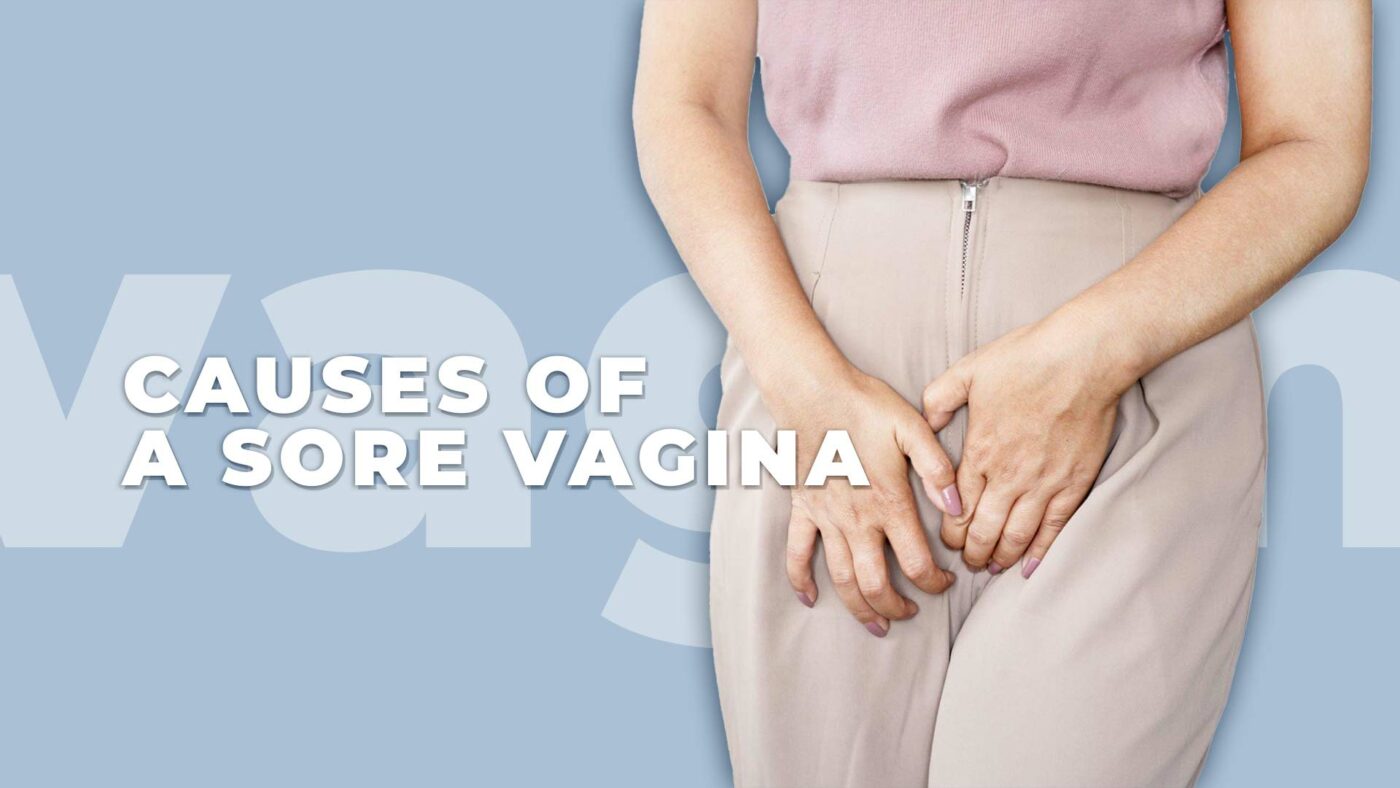Soreness After Sex: Understanding the Causes of Vaginal Soreness

If you’re experiencing vaginal soreness after sex, it’s natural to have questions. While some people enjoy rough sex that can cause some discomfort, it’s important to remember that sex should not be painful in most cases. It’s essential to communicate with your partner and gynaecologist if you experience pain during or after sex, medically known as dyspareunia.
You shouldn’t feel like there’s something inherently wrong with your body, and it’s essential to address the issue. Take a look at this list of potential causes for vaginal soreness after sexual intercourse and learn about the preventive measures you can take to avoid it in the future.
Table of Contents
Is it normal to be sore after sex?
To clarify, experiencing pain after sex is not considered normal (and we’re not referring to consensual pain during sex – we’re talking about unwanted pain). The only time it may be normal to experience soreness after sex is if it’s your first time and your hymen stretches or tears.
However, just because it’s not normal doesn’t mean it never happens. In fact, the American College of Obstetricians and Gynecologists (ACOG) states that almost three out of four women will experience pain during sex at some point in their lives. While some people may only experience temporary pain, others may have it as a long-term issue.
Causes of a sore vagina

There are various factors that may lead to soreness in the vaginal area after sexual penetration. These causes include:
Insufficient lubrication
One of the most common reasons for pain during or after sexual intercourse is insufficient lubrication. The vagina naturally generates lubrication to clean itself when an individual is sexually aroused.
However, vaginal dryness can occur at any age due to low estrogen levels, even though it is frequently associated with menopause. Using lubricated condoms and oil-free lubricants can aid in the reduction of pain during and after sex.
Insufficient arousal
In certain cases, a person may not feel like engaging in sexual activity, or they may not be completely prepared to do so with their partner. According to the American College of Obstetricians and Gynecologists (ACOG), engaging in penetration when not aroused or prepared can make sex uncomfortable or painful, both during and after intercourse.
Low estrogen levels
Estrogen levels fluctuate significantly throughout an individual’s lifetime, such as during puberty, menopause, and pregnancy. These changes can result in low estrogen levels, which may cause symptoms such as pain during sex, hot flashes, fatigue, or mood shifts. Hormonal treatments may be used to manage this condition.
Menopause
The North American Menopause Society (NAMS) reports that menopause can cause vaginal dryness, a tighter vaginal opening, and the thinning of the vaginal walls. This lack of lubrication and flexibility can result in painful sexual experiences. A person should consult their doctor about potential treatment options and use lubricated condoms or lubricants during sex.
Past injuries
Suffering vaginal injuries may make sex painful or uncomfortable. For instance, giving birth to a large baby may tear the vagina, resulting in scar tissue formation and pain during intercourse. A person should talk to their doctor about possible treatments for vaginal scar tissue.
Latex allergies
If a partner employs a latex condom, a latex allergy may cause burning, itching, and pain. If a person has a latex allergy, they should consider using alternatives to latex condoms, such as polyisoprene condoms, internal condoms, or polyurethane condoms.
Skin disorders
Certain skin disorders, such as contact dermatitis, according to the ACOG, may result in skin cracking or ulcers near the vulva. This cracking can cause pain during or after sexual intercourse. To prevent skin irritation, an individual may need to avoid certain irritants, such as certain skin care products, clothing, and even some lubricants.
Ovarian cysts
Ovarian cysts are fluid-filled sacs that form on the ovaries and can cause symptoms such as pelvic pain, pain during sex, and difficulty urinating. Pain relievers or hormonal birth control may be prescribed to relieve symptoms, but surgery may be required in more severe cases.
Vaginitis
Vaginitis is a bacterial or fungal infection that causes inflammation in the vagina, with symptoms including odorous discharge, itchiness, and pain. Antibiotics or antifungal medication can be prescribed depending on the cause of the infection.
UTI
A urinary tract infection (UTI) occurs when bacteria travel from the anus or skin up the urethra and into the bladder or kidneys. Common symptoms include frequent urination, pain or burning when urinating, and blood in the urine. Treatment for UTIs typically involves antibiotics after a urine test and a physical exam.
STIs
- Chlamydia is an STI that can cause burning during urination, abnormal vaginal discharge, or pain during sex. It can be treated with antibiotics.
- Herpes is an STI that causes open sores on the genitals, with no cure available. However, medications can help reduce the number and severity of outbreaks.
- Gonorrhea is an STI that can cause infertility if left untreated, and may present with symptoms such as vaginal discharge, burning or pain during urination, bleeding between periods, or pain during sex. Medication can treat gonorrhea, but drug-resistant strains are becoming more common.
Medical conditions
- Vulvodynia is a condition that can cause pain in the vulva, typically at the vaginal opening. Medical intervention, such as medication or surgery, may be necessary to treat this condition.
- Vaginismus is a condition that causes involuntary spasms of the muscle between the vaginal opening and the anus, making penetration and sex difficult and painful. Physical therapy, biofeedback, vaginal dilators, cognitive behavioral psychotherapy, relaxation exercises, and certain medications can be used to treat it.
- Bladder inflammation, also known as interstitial cystitis, is a chronic condition causing an irritated or inflamed bladder wall, with symptoms such as pain or pressure in the bladder or pelvis, frequent urination, and pain during sex. Treatment includes medication, bladder training, and surgery.
- Prolapsed bladder is a condition where the bladder pushes through into the vagina due to weakened pelvic floor muscles and tissues, causing symptoms such as pain in the vagina, frequent UTIs, and pain during sex. Treatment may include surgery, therapies to strengthen the pelvic floor, and medication.
- Lichen sclerosus is a rare chronic condition that causes inflammation of the skin around the external areas of the genitals, typically before puberty or after menopause. It causes pain, burning, and itching and often requires aggressive treatment with topical steroids.
- Endometriosis is a condition where tissue similar to the lining of the uterus grows outside of the uterus, with symptoms such as pain during and after sex, infertility, pelvic pain, digestive issues, and bleeding or spotting. Treatment may include pain medication, hormone therapy, or surgery to remove the growth.
Sexual abuse
- Vulvodynia is a condition that can cause pain in the vulva, typically at the vaginal opening. Medical intervention, such as medication or surgery, may be necessary to treat this condition.
- Vaginismus is a condition that causes involuntary spasms of the muscle between the vaginal opening and the anus, making penetration and sex difficult and painful. Physical therapy, biofeedback, vaginal dilators, cognitive behavioral psychotherapy, relaxation exercises, and certain medications can be used to treat it.
- Bladder inflammation, also known as interstitial cystitis, is a chronic condition causing an irritated or inflamed bladder wall, with symptoms such as pain or pressure in the bladder or pelvis, frequent urination, and pain during sex. Treatment includes medication, bladder training, and surgery.
- Prolapsed bladder is a condition where the bladder pushes through into the vagina due to weakened pelvic floor muscles and tissues, causing symptoms such as pain in the vagina, frequent UTIs, and pain during sex. Treatment may include surgery, therapies to strengthen the pelvic floor, and medication.
- Lichen sclerosus is a rare chronic condition that causes inflammation of the skin around the external areas of the genitals, typically before puberty or after menopause. It causes pain, burning, and itching and often requires aggressive treatment with topical steroids.
- Endometriosis is a condition where tissue similar to the lining of the uterus grows outside of the uterus, with symptoms such as pain during and after sex, infertility, pelvic pain, digestive issues, and bleeding or spotting. Treatment may include pain medication, hormone therapy, or surgery to remove the growth.
Sexual abuse
Survivors of sexual abuse may experience vaginal tightening and tension during sexual intercourse, leading to pain. If this is the case, it is important to speak to a doctor who may refer them to a psychiatrist or pelvic floor physical therapist.
Swollen vagina after sex

Post-sex, it’s not uncommon to experience swelling and irritation in the labia, which can occur naturally due to an increase in blood flow and fluids to the area during arousal. If you’re only experiencing swelling and inflammation without pain, there may not be any cause for alarm. However, if you also experience pain along with the swelling, it could indicate minor irritation from the pressure and friction.
This discomfort should typically subside within a few hours or by the next day. But if the swelling persists or you notice additional symptoms such as painful urination, throbbing, or burning sensations, it may indicate an infection requiring prescription treatment. It is advisable to schedule an appointment with a healthcare provider in such cases.
How to find relief?
Depending on the cause of your vaginal pain, there are various ways to alleviate your discomfort. In some cases, you can manage your symptoms at home. Other times, you may need to see a healthcare provider for treatment.
- Ice pack
If your vaginal pain is due to friction or pressure, applying a cold compress may help ease your discomfort. Wrap an ice pack in a cloth and place it on your vulva for 5 to 10 minutes. Avoid putting the ice pack directly on your skin or inserting it into your vagina. If using an ice pack causes more pain, stop and consult a healthcare provider.
- Antibiotics
Prescription antibiotics can effectively treat infections such as UTIs, STIs, and pelvic inflammatory disease (PID). Over-the-counter treatments are available for yeast infections, but it’s best to seek a diagnosis and treatment recommendation from a healthcare provider before trying any self-treatment.
- Hormonal treatment
Hormone replacement therapy can be helpful for some people who experience vaginal pain due to menopause. It can also help restore natural lubrication and alleviate pain during sexual intercourse. For individuals with endometriosis, hormonal birth control may be prescribed by a healthcare provider to prevent painful episodes.
- Surgery
If you have a Bartholin’s cyst or uterine fibroids, your healthcare provider may recommend surgery to remove them. In some cases, draining the cyst may be attempted before removing the gland.
- Lubricants
Using water-based lubricants during sexual activity can help reduce friction and discomfort. Avoid oil-based lubes, which can break down the material of a condom and cause tearing. Don’t hesitate to reapply as needed.
- Allergy-free products
If you suspect you’re allergic to materials in your condoms or sex toys, try switching to polyurethane condoms or synthetic materials. Avoid using lube if it makes your vulva sensitive.
- Pelvic floor muscle exercise
Performing reverse Kegels can help relax your pelvic floor muscles and reduce pain during and after sexual intercourse. It can also make sexual penetration more comfortable and enjoyable.
- Therapy
If you experience anxiety related to painful sexual intercourse, sex therapy can help you manage your anxiety and improve your sexual experiences.
When to see a doctor

It is recommended to consult a healthcare provider if painful sexual intercourse or post-sex pain persists despite using lubricants or other treatments. It is also important to seek medical attention if any other symptoms accompany the pain, such as itching, burning, or the presence of a foul-smelling discharge.
Final thoughts
Painful sexual penetration is not normal and should be addressed with a healthcare provider, even if it subsides within a day or two. By working together, you and your healthcare provider can identify the underlying cause of the pain and take appropriate measures to treat it, as well as prevent its occurrence in the future.
References
- Bladder prolapse (cystocele). (2020).
https://www.urologyhealth.org/urologic-conditions/bladder-prolapse-(cystocele) - Chlamydia – CDC fact sheet. (2014).
https://www.cdc.gov/std/chlamydia/stdfact-chlamydia.htm - Endometriosis. (2019).
https://www.womenshealth.gov/a-z-topics/endometriosis - Genital herpes – CDC fact sheet. (2017).
https://www.cdc.gov/std/herpes/stdfact-herpes.htm - Gonorrhea – CDC fact sheet. (2014).
https://www.cdc.gov/std/gonorrhea/stdfact-gonorrhea.htm - Interstitial cystitis (bladder inflammation). (n.d.).
https://www.columbiadoctors.org/condition/interstitial-cystitis-bladder-inflammation - Lichen sclerosus. (2019).
https://rarediseases.org/rare-diseases/lichen-sclerosus/ - McLean, A. S., et al. (2012). Acute severe pain is a common consequence of sexual assault.
https://www.ncbi.nlm.nih.gov/pmc/articles/PMC3437775/ - Ovarian cysts. (2019).
https://www.womenshealth.gov/a-z-topics/ovarian-cysts - Urinary tract infection. (2019).
https://www.cdc.gov/antibiotic-use/community/for-patients/common-illnesses/uti.html - Vaginal discomfort. (n.d.).
https://www.menopause.org/for-women/sexual-health-menopause-online/causes-of-sexual-problems/vaginal-discomfort - Vaginal dryness. (2017).
https://www.womens-health-concern.org/help-and-advice/factsheets/vaginal-dryness/ - What are the symptoms of vaginitis? (2016).
https://www.nichd.nih.gov/health/topics/vaginitis/conditioninfo/symptoms - What causes painful sex? (n.d.).
https://www.hopkinsmedicine.org/health/wellness-and-prevention/what-causes-painful-sex - When sex is painful. (n.d.).
https://www.acog.org/patient-resources/faqs/gynecologic-problems/when-sex-is-painful - You asked it: Allergic to latex? (2019).
https://www.teenhealthcare.org/blog/yai-allergic-to-latex/
Disclaimer
HisBlue is not a substitute for professional medical care or advice from your doctor. The health information on the HisBlue website is general and provided for your information only. We have ensured our content is accurate and current, with reviews by expert doctors. However, we cannot guarantee its accuracy or timeliness. This information is not meant to replace the diagnosis, treatment, or judgement of your doctor or another qualified healthcare provider.


